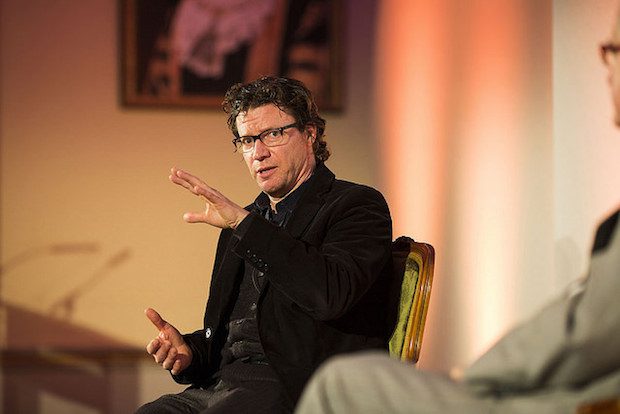Against Kant and Consumerism

Matthew Crawford is a motorcycle mechanic with a degree in physics and a Ph.D. in political philosophy. In Shop Class As Soul Craft, he surprised the world with a fascinating ethics of vocation—one that advocated manual work and blue-collar jobs, thus running counter to popular conceptions of what makes a job “good.” His unusual background enables him to marry abstract philosophy with technical discussions of skill.
The subtitle to his latest book promises a look at our “age of distraction.” There have been a plethora of articles on this topic of late—they bemoan our lack of “mindfulness” and diagnose the ills of our attention-deficit society. A book on this age of distraction would perhaps reflect upon the mind as affected and shaped by technology. It would consider televisions and smartphones, Twitter and Google. But in fact, Crawford’s book takes on an immensely grander project. The World Beyond Your Head isn’t about technological distractions, it’s about another kind of virtual reality and its deceptions—about the epistemological frauds we have believed since the Enlightenment.
The premise of Crawford’s book is that our distractedness is merely symptomatic of a deeper cultural defect, a misrepresentation of the self that has permeated our society. He traces this back to Enlightenment philosophy, especially the thought of Immanuel Kant. Enlightenment thinkers of the late 17th and 18th centuries presented a view of the person that contrasted drastically with medieval and ancient thought: they put unprecedented emphasis on the rational individual as separate from society or community. They posited new theories about freedom founded upon reason and self-determination, with epistemological roots in ideas such as Descartes’s famous claim that “I think therefore I am.” Kant believed that knowledge and ethics must necessarily be situated within the mind—that existence must be interpreted through the autonomy of the individual.
In advancing this claim, Kant built a “high wall between the empirical world and the purely intellectual, where we discover a priori moral laws,” writes Crawford. “Reasons to act must come only from the latter if we are to be free, and the will is to remain pure, ‘unconditioned’ by anything external to it.” This has led to a society in which individuals can never fall back on real-world authorities, traditions, or supports. Rather, we are constantly striving to develop lives of meaning without any outside recourse. The soul is increasingly insulated from the world outside our heads. Whereas in the real world, Crawford writes, “we are subject to the heteronomy of things; the hazards of material reality,” what Kant has given us is our modern identification of freedom with choice, in which choice is a “pure flashing forth” of the individual will.
This association set the stage for today’s culture, in which choice “serves as the central totem of consumer capitalism, and those who present choices to us appear as handmaidens to our freedom.” Kant, by trying to secure the freedom of the will from outside influence, severed our minds from any causal relationship with the world. With this isolation comes fragility—the fragility of a self that cannot tolerate conflict or frustration. “When dumb nature is understood to be threatening to our freedom as rational beings, it becomes attractive to construct a virtual reality that will be less so, a benignly nice [reality] where there is no conflict between self and world.” Autonomy, instead of bringing freedom, makes us slaves to the comforts of an arbitrated reality.
Consumer culture tries to destroy the discomforts and imperfections that are necessarily part of life. Take modern cars: they are designed in an insulating and distracting way. Very rarely can a driver feel their speed or have a sharp understanding of the perils of the road: we are wooed into complacent passivity by the smooth pace of the drive, the silence of the engine, the pop music playing on the speakers. Everything within a car is constructed to give a sense of isolation and ease. Automobiles “can foster circumspection—literally, looking around for others and regarding oneself as an object for others in turn—or a collection of atomized me-worlds.” Our experience becomes ever more “mediated by representations, which remove us from whatever situation we inhabit directly, as embodied beings who do things.”
The cultivation of “me-worlds” extends beyond automobile design. Crawford spends a good deal of the book arguing that an Enlightenment approach to epistemology leads to narcissism: an understanding of the world that revolves entirely around the self. The narcissist “treats objects as props” and struggles to comprehend them as objects with a reality of their own. The fantasy of autonomy, when full-grown, results in a “project of open-ended, ultimately groundless self-making.” Interestingly, Crawford identifies our treatment of others as the root of online narcissism in the age of Facebook: “We increasingly deal with others through representations of them that we have,” he writes. “This results in interactions that are more contained, less open-ended, than a face-to-face encounter or a telephone call, giving us more control.”
Crawford could have written in greater depth of the relationships—with friends, family, and community—that necessarily shape the self and the society in which we live. Our relationships are ever more removed from reality by layers of virtual media: Twitter, Facebook, Instagram, and Snapchat become substitutions for real-time interactions. What consequences will this have? As it is, Crawford remains more abstractly focused on the individual’s relation to the world of consumerism in which one is constantly pulled about by distractions. His discussions of community mostly focus on the relationships between teacher and student, craftsman and apprentice. As with Shop Class as Soul Craft, this book has a vocational bent.
Alexis de Tocqueville observed that Americans’ love of autonomy could have grave consequences: he wrote in Democracy In America, “Not only does democracy make every man forget his ancestors, but it hides his descendants and separates his contemporaries from him; it throws him back forever upon himself alone and threatens in the end to confine him entirely within the solitude of his own heart.” Whereas Enlightenment philosophers believed that knowledge must begin and end within the self, Crawford points to Hegel, who believed “we need other people as a check on our own self-understanding.” Crawford also references Tocqueville and Soren Kierkegaard to argue that individualism does not in fact foster individuality. 
Individualism, defined as an Enlightenment doctrine about how we acquire knowledge, was meant to “liberate us from authority” via “radical self-responsibility.” Yet this enforced self-sufficiency has resulted in slavery to consumer culture and public opinion. In contrast, “it is by bumping up against other people, in conflict and cooperation, that we acquire a sharpened picture of the world and of ourselves, and can begin to achieve all the earned independence of judgment.” Individuality—with all the intellectual freedom it brings—stems from our integration into a tradition, a place, and a skillset.
To demonstrate this, Crawford looks to the hockey player, the short-order cook, the jazz pianist, the motorcycle racer, and the organ maker: all of them artists, all of them embedded within the thought and theory of a specific tradition. All of them are proficient and free within their skillset. Crawford argues that to be free from our culture’s distractions, we must cultivate an awareness of—and love for—the world beyond ourselves. This is perhaps best described by an Iris Murdoch quote Crawford employs in both Shop Class as Soul Craft and this book:
If I am learning, for instance, Russian, I am confronted by an authoritative structure which commands my respect. … My work is a progressive revelation of something which exists independently of me. Attention is rewarded by a knowledge of reality. Love of Russian leads me away from myself towards something alien to me, something which my consciousness cannot take over, swallow up, deny or make unreal.
Obviously, this book is about much more than overcoming distraction. It is about seeking individuality and the freedom that emanates from an excellent and virtuous soul. Crawford’s book is crammed to overflowing with thought and theory, and some parts seem tedious or knotted—it is difficult to discern his whole argument until the very end, at which point one can retrace one’s steps and follow the intermingling threads. Some of his arguments seem half-baked: Crawford’s introductory consideration of the “attention commons” is fascinating—he suggests that silence ought to be preserved and protected, like water or air—yet this idea remains unmentioned throughout the book until the closing pages. His suggestion that we bring back “hands-on education” is vague: some sort of apprenticeship model, if incorporated into a robust education system, would most definitely be useful, but the specifics matter and are the real challenge. Crawford’s book is strong on theory but lacking in practical application.
That said, The World Beyond Your Head argues well that true individuality stems from the robust nurturing of a “little platoon,” from integration into associations that foster excellence and meaning. For American society to emerge from the distractions of consumer culture and virtual existence, we must look beyond the symptoms and consider the disease: the shroud of individualism that prevents us from fully embracing the real world.
Gracy Olmstead is an associate editor of The American Conservative.
Comments